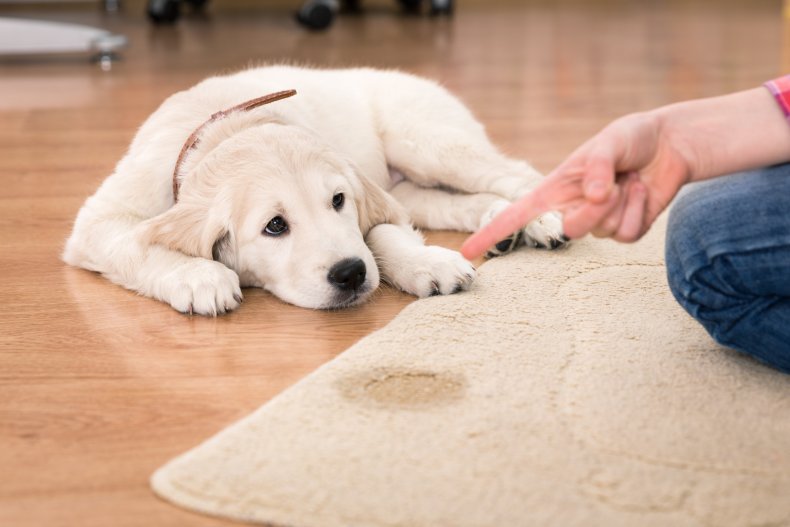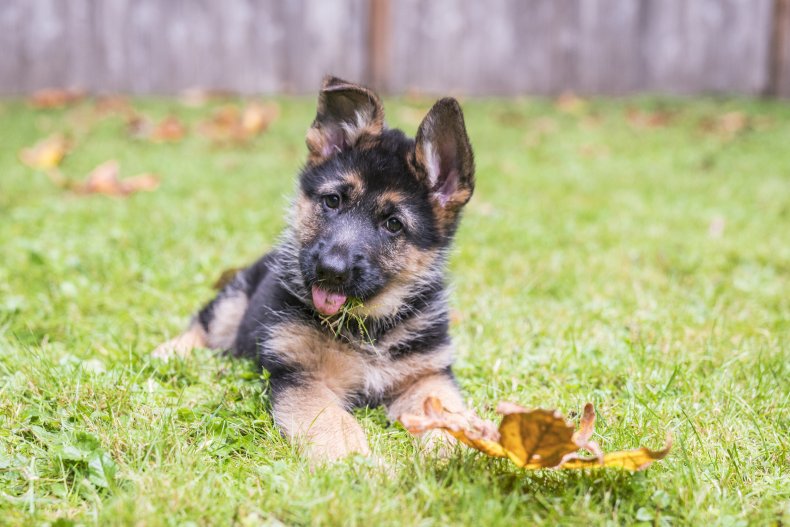How to Discipline Your Puppy Effectively, According to Experts - Newsweek
A puppy is a big commitment. They bring love and joy to your home and family, but need a lot of attention. Puppies have no experience of the outside world so they need to be properly trained in order to become friendly adult dogs.
Training a puppy requires consistency and patience, but with the right guidance it can be achieved within a few months. Veterinarians and dog behavior experts stress the importance of not punishing your puppy when it misbehaves. So, how do you train your little furry friend?
What Is the Most Effective Way to Discipline a Puppy?
Amanda Gagnon, a dog trainer from New York City, told Newsweek that when people ask about how to discipline a dog, what they really mean is how to stop the animal exhibiting some problematic behavior. The best way to discipline your puppy is to reward them when they show desirable behavior in that context.
"Someone might want to know how to discipline their dog when he barks at the sound of the doorbell. To improve that problem, we should reward the dog for responding quietly to the sound of a doorbell. That's what training is all about," she said.
People expect to be told that they need to punish their dog—maybe with a zap or a rebuke—but Gagnon believes these punitive reactions aren't necessary to train a dog and cause anxiety and aggression when used incorrectly.
Dr. Christian Broadhurst, a senior veterinarian at nonprofit clinic Clay Humane in Florida, agrees that those tactics don't work when training dogs. This is especially true of puppies who may see them as play, which will only encourage their bad behavior.
He recommends positive reinforcement—giving your puppy a treat when it does something good and taking your attention away from it when it exhibits bad behavior.
"With puppies, all they want is your attention 24/7, so the way we punish puppies is by taking away your attention whenever they do something you don't like.
"If you're playing with your puppy and they bite you on the hand, the first thing to do is stop playing with the puppy and they'll make the connection that when they bite the playtime goes away," he told Newsweek.
Another way to train puppies is to have an older dog at home who can discipline them, according to Broadhurst. "Adult animals are the best ones to discipline dogs because they basically speak the same language. When a dog grabs a puppy and holds it down to the ground, it's establishing dominance. But this does not translate well with humans, which is why we do not recommend that people do that."
What to Do When They Don't Listen
If your dog is unable or unwilling to offer a requested behavior on cue, you need to assess your own teaching strategy, according to Gagnon.
"First, we need to check in on whether we have taught our dog how to listen to the instruction. Have I taught them what it means when I make that request? Have I motivated them to perform that behavior when I request it? Have I set my dog up for success by rewarding the desired behavior in this particular context? If I haven't done all three of those things, I cannot reasonably expect them to listen in all contexts yet."
Asking a dog to exhibit a behavior you haven't taught them is an unreasonable expectation—like asking a kindergartener to recite Shakespeare, she said. "Ensure that the cue you are requesting has a solid foundation, then practice it with increased distractions in a variety of contexts until your dog can reliably perform the desired behavior on cue."

How to Stop Them Biting
Not biting is the most important thing to teach your dog, according to Gagnon, and it must be taught during their early days. "Most dogs need to learn it during their first year. It is often incredibly difficult to completely resolve in adulthood.
"For puppies, it's easy. We start by giving the puppy appropriate feedback when they bite so that the puppy learns that humans are fragile. Following this, we redirect them to toys each time they mouth us. The first step is by far the most important."
It's far more difficult to teach older dogs. If your older dog exhibits this kind of behavior, Gagnon believes you have an ethical responsibility to engage a professional certified trainer or behavior consultant, to get an assessment of the options for your dog and to protect your neighbors and yourself from harm.
How to Potty Train Them
You don't want to be constantly cleaning dog's mess off your carpets, so teach your puppy when and where to go potty.
There are three rules to follow in this process, according to Gagnon. "One: reward the puppy with treats every time they go in the right place. Two: prevent the puppy from making mistakes by using gates, a crate, or a leash to keep them from having accidents in the wrong places. Three: put them on a consistent food, water and [outing] schedule."
Broadhurst also recommends positive reinforcement. "You absolutely reward them with food or with attention. When your puppy comes in from going potty outside, the first thing you do is tell him 'Good dog' or 'Good job.' You baby talk them and give them a high-pitch voice, pet them. For a puppy that's probably enough, they're super-excited about that."
What to Do When Your Dog Gets Aggressive
Aggression is a serious problem but, according to Broadhurst it's very different in puppies than it is in adult dogs. This behavior in puppies is usually just overly aggressive play, which can be disciplined with positive reinforcement.
"If it's a puppy we're talking about and they just start biting you, you can fix that with a timeout. Stop giving them the attention they want and they will very quickly learn that biting is bad.
"But if your adult dog is showing aggression and biting people, then it's absolutely the case to see a behavior specialist about how to deal with aggression in dogs."
Broadhurst said the most aggressive dogs he had ever seen are the ones who never leave the house. "They don't know strangers, they've never seen a kid on a bike before and then they get very scared and aggressive because they don't know what to expect." So, he suggests taking your well vaccinated puppy to the park or to friends' houses, so the dog can get lots of experiences and learn how to be friendly.
If your dog behaves aggressively, for any reason, you should reach out to a certified dog behavior consultant immediately, according to Gagnon. "The biggest mistake people make is waiting too long to call in help. Once a dog has rehearsed a problem behavior for a long period of time, undoing it becomes much more difficult."
To find a trained consultant, she suggests using the search function at the International Association of Animal Behavior Consultants website.




Comments
Post a Comment